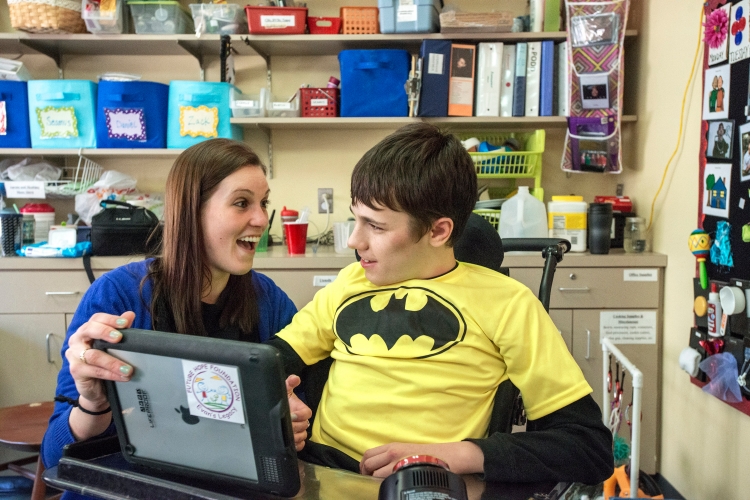
By
A $50,000 grant from the Future Hope Foundation will allow the Boston College Campus School to provide an iPad and instructional technology to each student and teacher at the day school for students with severe special needs.
The iPad initiative has been developed in memory of Evan Keohane, a nine-year-old Campus School student from Sherborn who passed away last November. Paired with communication hardware and software, the tablets can help students communicate with teachers and family, as well as develop new skills and enjoy games and enrichment activities.
“Thanks to the generosity of The Future Hope Foundation, the iPad initiative provides an opportunity for our students to have access to new avenues for communication, education and recreation,” said Campus School Director Donald Ricciato. “This technology fits with our trans-disciplinary approach to teaching and learning at the Campus School, connecting our students, teachers, speech and language pathologists, graduate student assistants and student volunteers.”
The Future Hope Foundation was created by 2004 Boston College alumnus James Kelley and other supporters of the Campus School to raise funds and awareness about the program, which serves 39 area students between the ages of three and 21 who have severe special needs and complex health needs.
Kelley, the president of the foundation’s board of directors, helped to found the non-profit group after speaking with Evan’s father, John Keohane, at an event following the inauguration of Boston Mayor Marty Walsh ’09 in January 2014.
“When you speak to parents like John Keohane you just want to help,” said Kelley. “The Campus School was a place where Evan was happiest. We thought this was a great way to remember Evan and to support the students at the Campus School.”
The iPads are being introduced to the educational program this spring, said Ricciato. The tablet technology will be paired with adaptive software and educational applications for use in classroom and individualized therapy sessions.
“Our students cannot use a typical interface, like a keyboard,” said Ricciato. “The iPad opens up access to technology. For these students, it levels the playing field to provide the same opportunities students receive in other schools.”
The Campus School has a history in the development and use of cutting-edge adaptive technology. Boston College faculty, in concert with the school, developed the pioneering EagleEyes technology, which allows students with severely limited mobility to communicate using eye movements. They have also used CameraMouse, another adaptive communications technology developed by BC faculty.
Ricciato said the project will make the Campus School one of the first day schools for students with severe special needs to offer a computing device to each student, also known as 1:1 computing.
“The Future Hope Foundation is giving our students the possibility to have all the educational opportunities they can have,” said Ricciato. “This support is crucial and a true asset to our programs.”



